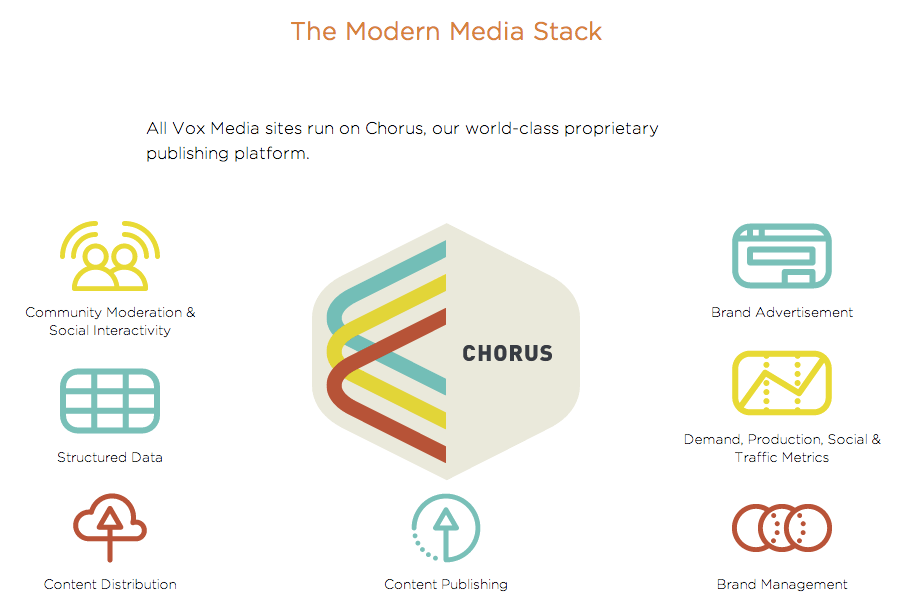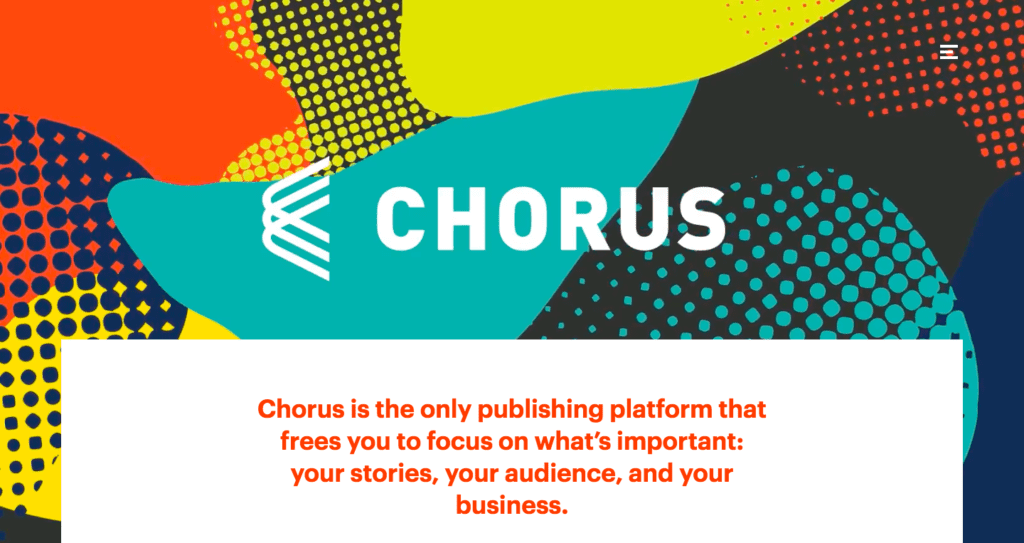|
Getting your Trinity Audio player ready...
|
The technology that powers the platforms of digital publisher Vox Media—including The Verge, Vox and Recode—is now available for use by other publishers, reports Benjamin Mullin from WSJ.
This publishing technology, known as Chorus, is the software that Vox Media uses to produce and distribute its stories. It’s the technology that underpins the portfolio of sites Vox owns and operates, and can be used for a range of publishing activities, including creating and monetizing articles, monitoring readership and distributing content on social media platforms. It has been considered the company’s secret weapon, the element that differentiates Vox from its digital media competitors.
“Most journalists hate their content management systems,” Vox.com co-founder Melissa Bell told The New York Times way back in 2014. “The joke is that Chorus is a unicorn with a kitten on its back. People think it is a magical system that fixes everything.”
The company is beginning to license Chorus to other publishers in exchange for a recurring fee. Vox is already in talks with around 20 news and entertainment publishers about licensing the software.
In an age of revenue diversification, Vox is attempting to capitalize on publishers’ need for a low-cost software. Eventually, Vox is also considering licensing the software to clients outside the traditional publishing industry, like marketers and commercial brands.
“We’re not providing blogging software here,” Jim Bankoff, Vox Media’s chief executive, said. “This is different. We’re providing a suite of enterprise-grade services that combine to create a large platform for brands that need strong tools to manage everything from content creation to monetization.”

Vox expects the software licensing will provide a new revenue stream for the company, which last year became nearly profitable when it reached its target revenue of $160 million, while spending $162 million. Like other digital media firms, Vox Media is also fighting for a share of the competitive market for digital advertising dominated by Facebook and Google.
Vox Media believes Chorus provides an opportunity for publishers looking for “low-cost, high-quality technology.” The report says they decided to start the licensing program following the success of its partnerships with The Ringer and Funny or Die.
Mr. Bankoff did not comment on how much revenue he expects the Chorus licensing business to generate. According to one Vox Media executive, the company has plans to sell Chorus at different price points based on the demands of each client, with fees in the six and seven-figure ranges.

According to Vox, Chorus is the best-in-class platform built for publishers and studios that keeps pace with modern storytelling. Perfected over 10 years, it has evolved into an intuitive ecosystem that enables multimedia content creation, supports cross-platform programming, and delivers integrated, premium advertising at scale.
“We built Chorus to solve our problems, but now we are opening up Chorus to solve yours — all in the spirit of advancing modern storytelling across media, journalism and entertainment,” says Vox. “Chorus is the backbone of our portfolio of authoritative networks, supporting more than 350 unique brands, from Eater to SB Nation to The Verge.”
Vox Media will face competition both from publishing and technology companies as it sells Chorus, the Wall Street Journal reports. For example, the Washington Post has already started licensing Arc, the publishing technology system used in its newsroom, and WordPress, the website and blog building platform, also offers a high-end publishing technology service called WordPress.com VIP, used by customers such as Spotify and VentureBeat.


